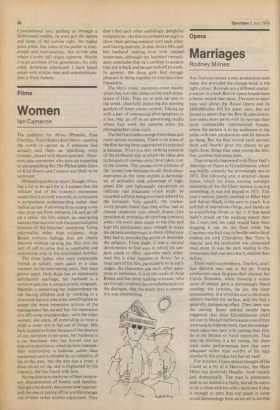Films
Women
Ian Cameron
The publicity for Wives (Phoenix, East Finchley, X certificate) describes it—putting the words in quotes as if someone had actually said them—as 'sparkling, witty comedy, played with charm and zest'. However, any customers who turn up expecting to see something like The Philadelphia Story or Kind Hearts and Coronets are likely to be surprised.
Misleading publicity apart, though. Wives has a lot to be said for it. I suspect that the militant end of the women's movement would find it entirely too mild, as its keynote is sympathetic understanding rather than radical action. Following three young wives who drop out from domestic life and go off on a spree, the film adopts an easy-going manner that accords with the empirical good humour of the heroines' enterprise. Using informality rather than stridency, Anja Breien conveys feelings that are clearly feminist without turning her film into the sort of call to arms that is watchable and convincing only to the established faithful.
The three ladies, who were inseparable friends at school, meet again at a class reunion. In the intervening years, they have grown apart. Only Kaja has an apparently satisfactory marriage; her husband is a solicitor and she is conspicuously pregnant. Heidrun is preserving her independence by not having children and by working in a chocolate factory where her unwillingness to accept the more repressive actions of the management has earned her the reputation of a left-wing troublemaker; with the other women, she starts off pretending to have a child in order not to feel out of things. Mie feels trapped at home because of the absence of day nurseries in her area; her husband is a car mechanic who has moved into an executive position in which he feels insecure; their relationship is habitual rather than passionate and is clouded by an infidelity of his in the past, but she also has a lover, a diver on an oil rig, and is frightened by the intensity she has found with him.
No big drama is made out of their temporary abandonment of homes and families: they get a bit drunk, pass some time together, and the idea of taking off for a while emerges out of their rather aimless enjoyment. They don't find each other unfailingly delightful companions: the film is confident enough to show them getting irritated with each other and having quarrels. It also shows Mie and her husband making love with mutual tenderness, although the husband immediately concludes that he's entitled to assume that she is back and he can rush off to work. In general, the three girls find enough pleasure in being together to maintain their friendship.
The film's comic moments come mainly when they turn the tables on the male population of Oslo. They try to pick up men in the street, cheerfully deploying the opening gambits of street corner wolves. Taking up with a pair of commercial photographers in a bar, they go off to an advertising studio where they work the cameras while the photographers pose coyly.
The film's attitudes emerge from these and more serious moments. There is no sense of the film having been constructed to expound a message. Wives is a very striking example of the profound way in which the ideas and techniques of cinema-v&ite; have taken root in the cinema. The cinema-TerW pictures of the 'sixties (one hesitates to call them documentaries as the term implies a particular set of attitudes) took advantage of highspeed film and lightweight equipment to infiltrate real situations which might be recorded without being too much altered by the intrusion. Very quickly, the cinemaverite people found that they either had to choose situations with inbuilt drama (like presidential primaries or sporting contests) where the event gave shape to the film and kept the participants busy enough to make the camera unimportant to them. Otherwise they had to provoke the action or interview the subjects. From there, it was a natural development to find ways in which the subjects could in effect interview each other. And this is what happens in Wives: for a large part of the film, particularly in its early stages, the characters ask each other questions or reminisce. It is to the credit of Anja Breien and her three leading actresses, who are fittingly credited also as collaborators on the dialogue, that the result here is perceptive and entertaining.


































 Previous page
Previous page